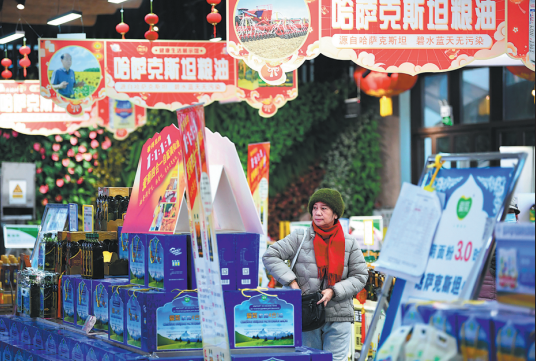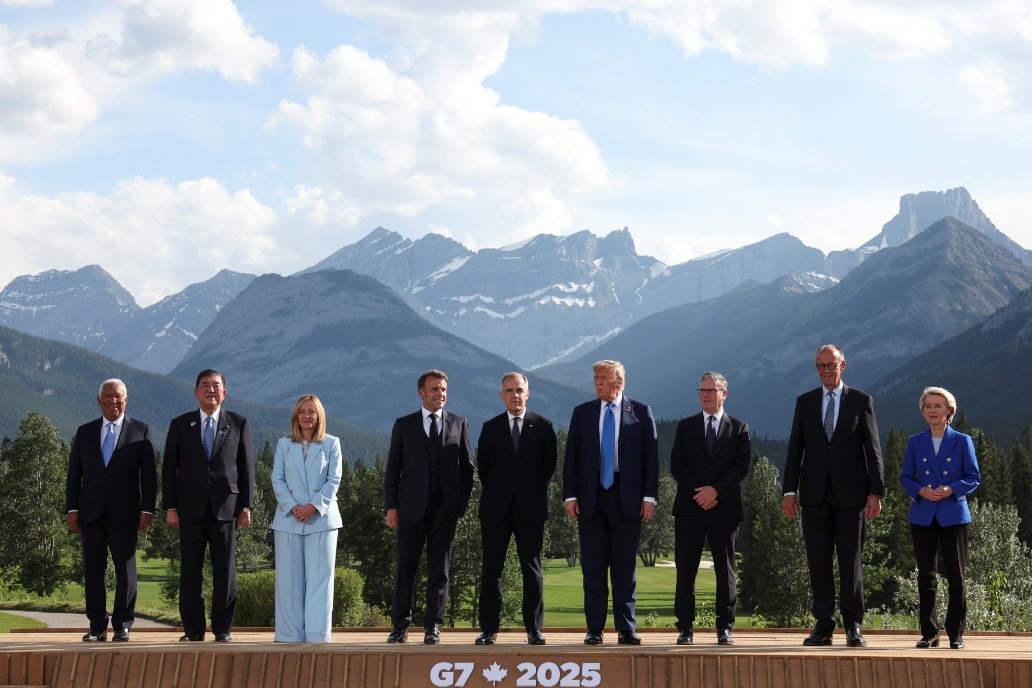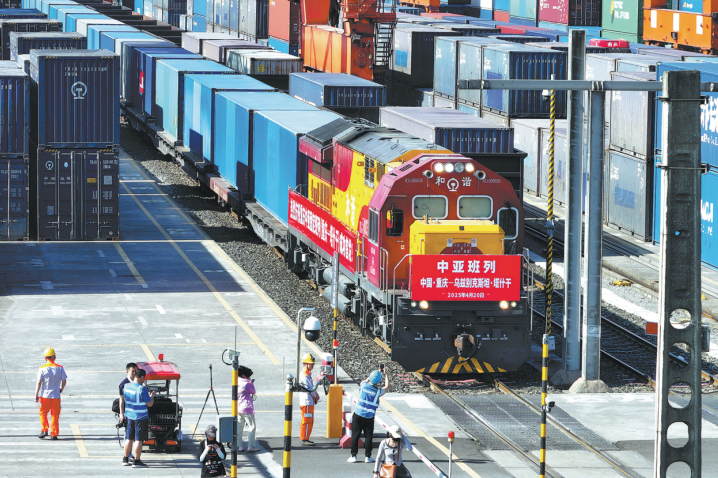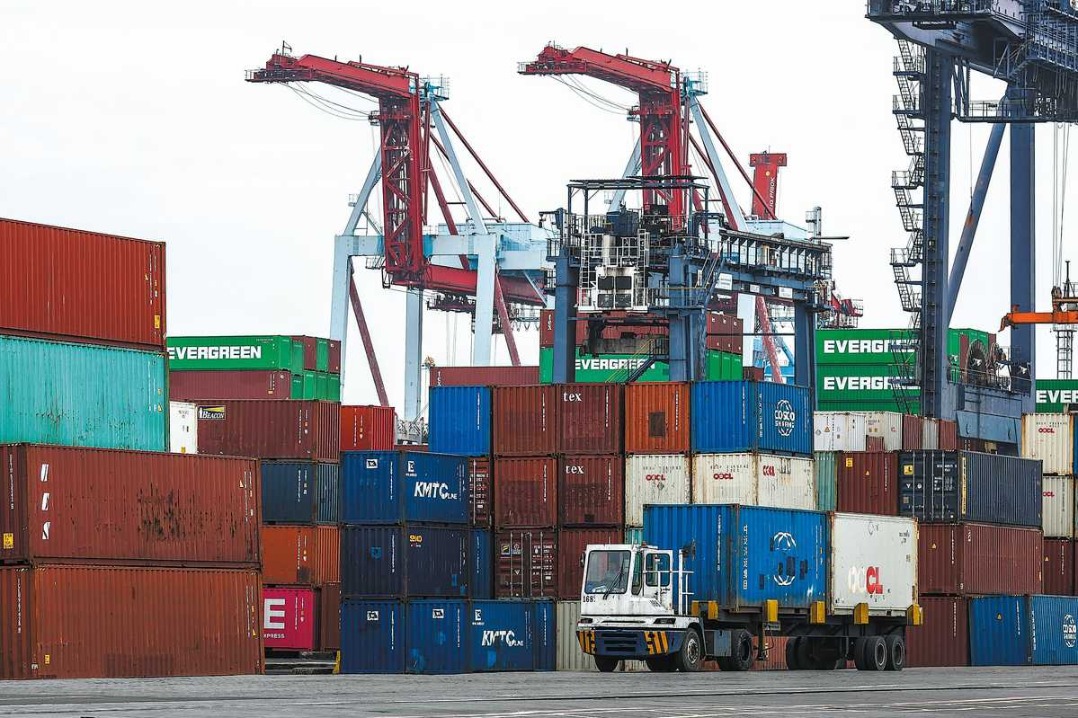'Steel camel caravan' deepens regional connectivity
Freight train helping goods from Central Asia reach major global ports directly via Tianjin Port and enabling cargo from Japan, South Korea and Southeast Asia to arrive at trade destinations


At the China-Central Asia Summit held in 2023, China vowed to enhance connectivity through measures such as accelerating port upgrades and developing China-Europe freight train hubs.
One notable outcome of the summit is the China-Kazakhstan (Xi'an) Trade Logistics initiative, jointly launched by KTZ Express and Xi'an Free Trade Port Construction and Operation last December.
Sun Weidong, secretary-general of the secretariat of the Central Asia-China format, emphasized that China-Central Asia relations have leapfrogged under the strategic guidance of leaders, with cooperation in various fields showing even broader prospects.
He highlighted recent high-level visits, such as Kyrgyz president's successful visit to China earlier this year. These exchanges have deepened strategic partnerships and strengthened bilateral relations.
China and Kazakhstan are committed to creating a new "Golden Thirty Years" in their bilateral relations, while China and Tajikistan are working toward developing a comprehensive strategic partnership for a new era. Meanwhile, China continues to maintain close high-level exchanges with other Central Asian countries.
Under the Belt and Road Initiative, China and Central Asian countries have strengthened strategic alignment and carried out comprehensive cooperation based on mutual benefit.
Last year, trade between the two sides reached a record $94.8 billion, with China serving as the most important investment and trade partner for Central Asian countries.
China's "new three" products — electric vehicles, solar batteries, and lithium-ion batteries — have provided strong momentum for exports to Central Asia, while cooperation in areas such as digital trade, modern agriculture and the green economy has flourished. Highlights have emerged in local economic and trade exchanges, cross-border transportation cooperation has developed rapidly, and the China-Kyrgyzstan-Uzbekistan railway project has been launched.
Additionally, China has shared its successful experiences with Central Asian countries in fields such as poverty alleviation, desertification control and ecological protection.
The connectivity of infrastructure effectively reduces the cost of international trade for participating economies in the Belt and Road Initiative, enhancing their ability to integrate with the global economy and stimulating stronger development momentum.
A research by the Asian Development Bank shows that a 10 percent reduction in infrastructure-related trade costs can lead to a 20 percent increase in exports for landlocked countries.
Zhang Wenlin, vice-president of Kangtai Plastic Science & Technology Group, recently returned from a business trip to Uzbekistan and Kazakhstan with managers of other Chengdu-based enterprises.
He believes the Central Asian region holds great development potential, though challenges coexist with opportunities, requiring in-depth understanding and long-term commitment.
"At present, there are still many opportunities in the Central Asian market," Zhang said. "This region is vast, with substantial market capacity in areas such as infrastructure construction and urban renewal."
He added that the company plans to take a "two-step" approach moving forward: First, it will form a dedicated foreign trade team for Russian-speaking regions to explore the market and quickly collaborate with business partners through trade. Second, it plans to establish a factory in Kazakhstan and is currently coordinating with various industrial parks to conduct preliminary research.
"For businesses going global, the most important thing is to operate legally and compliantly, showcasing robust capabilities to truly achieve mutual benefit and win-win outcomes," Zhang said.
Song Yangchao, general manager of Chengdu GengXin Furniture Co Ltd, agreed with Zhang's viewpoint.
His company signed a cooperation agreement with Eco Wood Plyus, the largest furniture enterprise in the Tashkent region of Uzbekistan, intending to form a joint venture and preparing to share production technology.
"I believe Central Asia is a very dynamic market, bringing new development opportunities for many domestic enterprises," Song said, adding that the company will focus on refining the cooperation plan to present it to relevant authorities.
He concluded that regional cooperation is an important component of practical collaboration between China and Central Asia. Under the leadership of heads of State and the impetus of the China-Central Asia Summit, friendly exchanges and cooperation at the local level between China and Central Asia are becoming increasingly close.

































